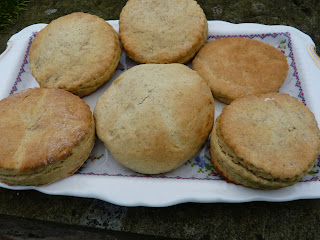Tonight it got a Japanese friend and I talking about the festival. So here are some pointers.
The big fancy dress / parties and trick-or-treat stuff all comes from America. And it's quite a modern invention. It's catching on in Europe and other parts of the world now, but traditionally in the UK (for example during my childhood) we had never even heard of trick-or-treat and any fancy dress and partying was reserved strictly for kids. (We would also do harmless things like apple-bobbing*).
In the UK, Halloween has never been a big commercial event like it is in the US. But the roots of Halloween are definitely European. And it's quite complicated!
The word Halloween is a version of 'hallowed evening' (holy evening) because in the Christian calendar, it is the night before two holy days: 'All Hallows' or 'All Saints' day (Nov 1) and then All Souls day (Nov 2) - dates for honouring saints and the recently departed. In Catholic teachings, Halloween was also the date before spirits moved from purgatory (an in-between place) into the afterlife. As a result it was thought that Halloween was the last chance that any angry dead had for revenge on past wrongs before they passed on. So people would dress up to disguise themselves from any vengeful spirits ...though as you will read below, this is not really a Christian idea.
When Protestant Christianity gained a foothold, purgatory was no longer part of the belief system. So the feared spirits on Halloween were believed to be not 'gaining revenge before moving on' but simply evil.
A practice that developed later on was 'souling' where special 'soul cakes' were baked and shared to honour the dead, and (often poor) children would go door to door to collect them. This is thought to be the origin of trick-or-treating, but of course without today's commercial element.
All sounds plausible. But in fact, the original spring dates for Halloween were changed in 835AD by the Pope. In the same way modern Christmas evolved, today's Halloween was repositioned to coincide with, and be adapted / adopted into an ancient Pagan or Celtic festival, called 'samhain'. Christianity was still relatively new to Western Europe and the British Isles then, and this kind of 'change management' practice seemed to be quite common!
Samhain marked the end of the harvest and signalled the start of dark winter. It was a festival where magic and other spirits were thought to roam about freely - sometimes invoking fear among the people. In order to be seen favourably, not least throughout the coming winter, people would give food offerings to the spirits, and even set dinner places for the dead at home to welcome them and bring good fortune. (You will note striking similarities to the Chinese Hungry Ghost Festival!) Bonfires were often lit as part of the cleansing and ceremonial activities - another element which was used in Christian Halloween.
In some Celtic communities, this ancient festival time also involved 'guising' (dressing up as the spirits, or in disguises so that bad spirits would not recognise you) - which is doubtless where today's costumes first derive from. Vegetables like turnips were sometimes carved to resemble spirits' faces and lit to guide the way of the 'guisers'. Hence the jack-o-lantern. A lot of what we know as 'traditional Christian Halloween' is actually ancient and Celtic / Pagan.
 |
| Soul cakes are still made today for All Souls day in some parts of the UK |
Shropshire soul cake recipe: http://theordinarycook.co.uk/2011/11/02/soul-cake-a-shropshire-recipe/
* Apple-bobbing
I thought I'd written about this before, but can't find it! Anyway this is a game we used to play in the UK on Halloween (and sometimes Guy Fawkes Night). It entails a barrel full of water with apples floating in it. You hold your hands behind your back and try to pick up a 'bobbing' apple using only your teeth. This particular practice stems from an ancient Roman one. During the fertility festival of Pomona (which fell at roughly this time of year) young people and couples were thought to improve their chances of marriage if they could bob for an apple. I don't think we had any inkling of this when we bobbed for apples as kids in the 1980s!
Photo credits: Wordpress, crazysalad
More reading: The Hungry Ghost Festival


No comments:
Post a Comment